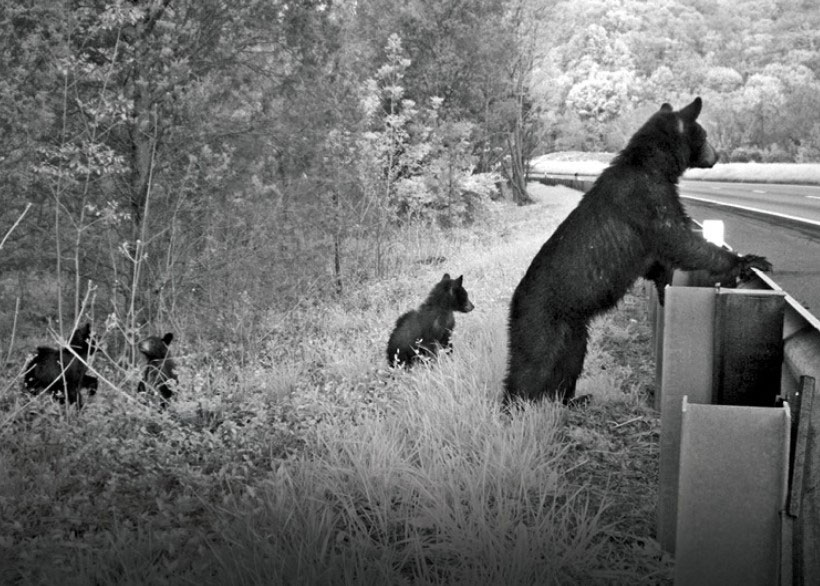
When Nikki Robinson walked out onto the stage during the final dress rehearsal for TEDx Asheville last month, the spotlights of the Diana Wortham Theatre shining in her eyes, she thought, “This is what it feels like to be a deer in the headlights.”

And then she smiled and relaxed a bit, realizing the irony of that thought. After having prepared for several months, Robinson was here at the Wortham Center for the Performing Arts precisely to talk about what it’s like to be an animal trying to cross a busy highway.
The TEDx Asheville 2022 event theme was Building Bridges; Opening Doors, a perfect topic for a presentation about how to stop roadkill in North Carolina. One of nine chosen speakers, Robinson is a native North Carolinian who is inspired by the rich flora and fauna from the Southern Appalachian Mountains to the Coastal Plains. One of her personal values is helping others develop a deep connection to nature and an awareness of its fragility.
Robinson is also the North Carolina Project Manager for Wildlands Network, which strives to restore wildlife habitat in order to re-establish wildlife corridors throughout North America. In this role, she works with community partners, state agencies, and NGOs to promote wildlife habitat connectivity initiatives across the state.
“Wildlands Network identified the core native wildlife habitat areas and the corridors that connect them. We call them Wildways,” said Robinson.” The Eastern Wildway contains some of North America’s most beloved national parks, preserves, scenic rivers, and other wild places, from the wilderness of Quebec, the Adirondacks, and the Shenandoah Valley, to the Everglades and Great Smoky Mountains National Park. Protecting and expanding these and other key core areas is crucial to ‘rewilding’ the East.”
“How do you feel about roadkill?” was the opening line of Robinson’s talk. “Let’s start with the obvious: It’s gross. It’s sad. It’s expensive. But it’s preventable. Before humans, wildlife moved wherever they pleased for basic needs like food, water, shelter, and mates. Now roads and development crosscut and fragment even our most wild places. Crossing a road is a relatively new survival skill, and a difficult one to master.”
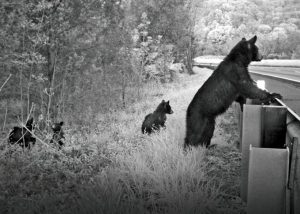
North Carolina wildlife contends with 80,000 miles of state-maintained highways that crisscross the landscape where many species still navigate using their own long-established system of unpaved pathways. Over the three-year period of 2017–2019, there were 56,868 wildlife–vehicle collisions, more than 2,800 human injuries, five human fatalities—and all this cost $156.9 million in property damage according to a June 2020 study from the North Carolina Department of Transportation.
“Every day, more than 26,000 vehicles travel through the Pigeon River Gorge on Interstate 40 between Asheville, NC, and Knoxville, TN.” Robinson continued. “This raging four-lane highway cuts through the mountains just outside Great Smoky Mountains National Park. For those who’ve traveled that stretch of I-40, you know it’s no Sunday cruise. The interstate winds through steep, rugged, breathtakingly beautiful terrain, but you don’t dare get distracted and you keep your eyes on the road. You’re gripping the wheel, traveling 60 mph, flanked by tracker trailers riding your tail or roaring past you. You have one goal: Get through the gorge as safely as possible.”
Robinson went on to ask her audience to imagine what it would be like to be a bear, a deer, or an elk trying to cross I-40. She pointed out the importance of inclusivity in planning how different species need to cross.
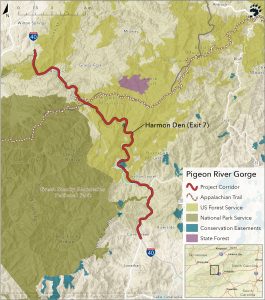
“Not all individuals or even species are wired the same,” she said. “They can be curious, but cautious. Adaptable, but apprehensive. Some don’t trust the tunnels, and some don’t like walking on the rugged surface of a pipe, or they have obvious physical limitations—for example, all of you with antlers, I’m sorry, you’re just not fitting through this culvert.”
Since 2017, two dozen federal, state, Tribal, and non-governmental organizations have been collaborating as Safe Passage: The I-40 Pigeon River Gorge Wildlife Crossing Project, working alongside state departments of transportation to make 20 miles in Western North Carolina and eight miles in East Tennessee more permeable for wildlife and safer for drivers. It was Wildlands Network that kicked off discussions about how to help prevent wildlife mortality along I-40 in 2015, and now their research in collaboration with partner National Parks Conservation Association holds the key to their success.
During COVID lockdown, these two organizations joined four other partners—The Conservation Fund, Defenders of Wildlife, Great Smoky Mountains Association, and North Carolina Wildlife Federation—to make it possible for donations to be collected for future road mitigation and wildlife crossing structures via a fund at SmokiesSafePassage.org.
Learn more about the TEDx Asheville event and watch Nikki’s presentation at tedxasheville.com.

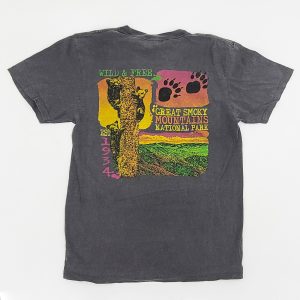
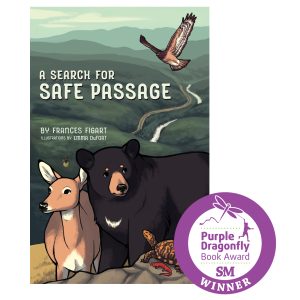
The Great Smokies Welcome Center is located on U.S. 321 in Townsend, TN, 2 miles from the west entrance to Great Smoky Mountains National Park. Visitors can get information about things to see and do in and around the national park and shop from a wide selection of books, gifts, and other Smokies merchandise. Daily, weekly, and annual parking tags for the national park are also available.